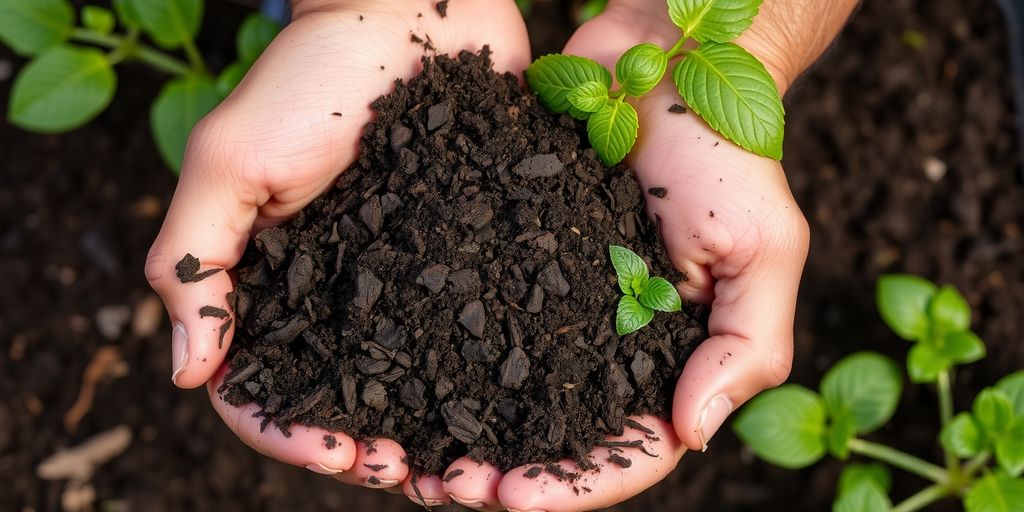Healthy soil is the foundation of a thriving garden. It provides essential nutrients, supports plant growth, and helps retain moisture. Whether you’re a seasoned gardener or just starting out, understanding how to improve and maintain soil health is crucial. This article will guide you through simple tips and techniques to unlock the secrets to rich, healthy soil, ensuring your plants flourish year-round.
Key Takeaways
- Healthy soil is vital for plant growth and overall garden success.
- Organic matter, like compost, is essential for enriching soil.
- Beneficial microbes play a crucial role in maintaining soil health.
- Avoiding chemicals helps preserve the natural balance of the soil ecosystem.
- Regular soil testing can help identify and address nutrient deficiencies.
Understanding the Basics of Soil Health
What is Soil Health?
Soil health is defined as the ongoing ability of soil to function as a living ecosystem that supports plants, animals, and humans. It’s crucial to see soil not just as dirt but as a vibrant, living system. Healthy soil can reduce costs, increase yields, and improve plant resilience.
The Importance of Soil Structure
Soil structure refers to how soil particles are grouped together. Good soil structure allows for better water infiltration, root growth, and air circulation. Poor soil structure can lead to compaction and erosion, which negatively impacts plant growth.
Key Indicators of Healthy Soil
Healthy soil has several key indicators:
- Stable pH: Not too acidic or alkaline.
- Good soil structure: Allows for water and air movement.
- High organic matter: Supports microbial life and nutrient availability.
- Biodiversity: A variety of soil organisms.
Dig into this complete guide to soil health. Unlock actionable insights to optimize yields, enhance sustainability, and regenerate soil health.
Organic Matter: The Building Block of Healthy Soil
Types of Organic Matter
Organic matter is essential for healthy soils. It includes decomposed plants and animals. Here are some common types:
- Kitchen scraps: Bury them in the soil, and worms will turn them into rich humus.
- Grass clippings: Fresh ones add nitrogen, while aged ones add carbon.
- Leaves: Collect them from your yard or your neighbor’s.
- Pruned branches and seedless weeds: They provide nutrients and moisture.
- Coffee grounds: Get them from local cafes to reuse as soil enhancers.
- Manures: Use aged manure, not fresh, to avoid chemicals.
- Mulch: A mix of green foliage and branches from local arborists.
How to Incorporate Organic Matter
Adding organic matter to your soil can be done in several ways:
- Compost: Add cured compost to your garden beds.
- Mulch: Apply mulch to the soil surface to retain moisture and add nutrients.
- Cover crops: Grow cover crops and till them into the soil.
These methods help in building soil health by adding nutrients and improving soil structure.
Benefits of Organic Matter for Soil Health
Organic matter offers numerous benefits for soil health:
- Nutrient-rich soil: It provides essential nutrients for plants.
- Improved soil structure: It helps create pockets of space for air, water, and microbes.
- Moisture retention: It helps the soil retain moisture, reducing the need for frequent watering.
- pH balance: It helps balance the soil’s pH levels, making nutrients more available to plants.
Healthy soils produce healthier plants with higher yields. They reduce your need for irrigation, inorganic fertilizers, and pesticides.
Incorporating organic matter into your soil is a simple yet effective way to improve its health and productivity.
The Role of Microorganisms in Soil Health
Beneficial Microbes and Their Functions
Microorganisms in the soil, such as bacteria, fungi, and viruses, play a crucial role in maintaining soil health. They help in nutrient cycling, organic matter decomposition, and disease suppression. Beneficial microbes can produce hormones that promote plant growth and compounds that protect plants from pathogens. They also help plants adapt to environmental stresses like drought and extreme temperatures.
How to Support Soil Microbial Life
To support soil microbial life, it’s essential to maintain a healthy soil environment. Here are some tips:
- Avoid using chemical fertilizers and pesticides as they can harm beneficial microbes.
- Incorporate organic matter like compost and manure to provide food for microbes.
- Practice crop rotation and cover cropping to enhance microbial diversity.
- Ensure proper soil aeration and moisture levels to create a conducive environment for microbial activity.
Common Misconceptions About Soil Microbes
There are several misconceptions about soil microbes that need to be addressed:
- All microbes are harmful: This is not true. Many microbes are beneficial and essential for soil health.
- Chemical fertilizers are better: While they provide nutrients, they can harm the microbial life that is crucial for long-term soil health.
- Microbes are only important for organic farming: Microbes play a vital role in all types of farming, not just organic.
Healthy soil is teeming with life, and supporting this microbial community is key to sustainable agriculture.
Practical Tips for Improving Soil Health
Avoiding Chemical Use
Stop using chemicals to encourage a healthy soil microbe population. This helps feed and protect your plants and avoids harming beneficial insects, pollinators, and wildlife. Instead, opt for natural alternatives like compost and organic fertilizers.
Effective Soil Amendments
Adding organic matter is crucial. Use compost, manure, or leaf mold to improve soil structure and nutrient content. These amendments help retain moisture and support beneficial microorganisms. Remember, organic matter is the building block of healthy soil.
The Importance of Soil Testing
Regular soil testing helps you understand your soil’s nutrient levels and pH. This information guides you in making informed decisions about fertilization and amendments. Soil testing is a simple yet powerful tool for maintaining soil health.
Healthy soil is the foundation of a thriving garden. By following these practical tips, you can discover the secret to the best garden soil – your plants will thank you!
Cover Crops and Mulching for Soil Health
Choosing the Right Cover Crops
Cover crops offer numerous benefits to soil health. They help reduce erosion by keeping the soil covered between growing seasons. Depending on the type, their roots can create macropores, alleviate compaction, and promote soil aggregation. Some cover crops even host beneficial fungi and bacteria, enhancing soil fertility. Selecting the right cover crop is essential for maximizing these benefits.
Benefits of Mulching
Mulching your garden beds provides several advantages. It helps retain soil moisture, suppresses weeds, and protects beneficial insects. Mulch also insulates the soil, safeguarding the root systems of perennial plants and bulbs. By keeping the soil covered, mulch prevents erosion and maintains soil structure.
How to Apply Mulch and Cover Crops Effectively
To get the most out of mulching and cover crops, follow these steps:
- Choose the appropriate mulch or cover crop for your soil and climate.
- Apply mulch evenly over the soil surface, ensuring a thickness of 2-4 inches.
- Plant cover crops during the off-season to keep the soil covered and enriched.
- Incorporate cover crops into the soil at the end of their growing season to boost organic matter.
Both mulch and cover crops are key to maintaining healthy soil. They work together to protect and enrich the soil, ensuring a thriving garden ecosystem.
Water Management for Optimal Soil Health
Understanding Soil Moisture Levels
Maintaining the right soil moisture is crucial for plant health. Healthy soil holds moisture like a sponge and releases it as plants need. If the soil is too dry, plants can’t access nutrients. On the other hand, waterlogged soil can lead to root rot and other issues. Aim for consistently moist soil for most plants, except for drought-tolerant varieties.
Techniques for Efficient Watering
Efficient watering techniques can make a big difference in soil health. Here are some methods to consider:
- Drip Irrigation: Delivers water directly to the plant roots, reducing water waste.
- Mulching: Helps retain soil moisture and reduces evaporation.
- Moisture Sensors: Use technology to monitor soil moisture levels and water only when necessary.
Preventing Soil Erosion Through Water Management
Soil erosion can be a major problem, but proper water management can help prevent it. Here are some tips:
- Terracing: Create steps on slopes to slow down water runoff.
- Cover Crops: Plant cover crops to hold the soil in place and reduce erosion.
- Rain Gardens: Design gardens to capture and absorb rainwater, reducing runoff.
Proper water management is key to maintaining healthy soil and ensuring your plants thrive. By understanding soil moisture levels, using efficient watering techniques, and preventing soil erosion, you can unlock the secrets to a rich, healthy garden.
The Impact of Soil Health on Plant Growth
Nutrient Availability and Uptake
Healthy soil is essential for making nutrients available to plants. Nutrients like nitrogen, phosphorus, and potassium are more accessible in well-maintained soil. Microorganisms in the soil help break down organic matter, releasing these nutrients in forms that plants can easily absorb. This process ensures that plants get the right amount of nutrients they need to grow strong and healthy.
Disease Resistance in Healthy Soil
Healthy soil can help plants resist diseases. Beneficial microbes in the soil compete with harmful pathogens, reducing the risk of plant diseases. Some microbes even produce natural antibiotics that protect plants. This means that plants grown in healthy soil are less likely to get sick and more likely to thrive.
Maximizing Crop Yields with Healthy Soil
When soil is healthy, crop yields can increase significantly. Healthy soil improves plant resilience, making them better able to withstand environmental stresses like drought or extreme temperatures. This leads to higher productivity and better-quality crops. Farmers who focus on maintaining soil health often see better results in their harvests.
Healthy soil is the foundation of a successful garden or farm. By focusing on soil health, you can ensure that your plants have the best chance to grow strong and produce abundant yields.
Conclusion
Creating rich, healthy soil doesn’t have to be complicated. By following these simple tips, you can transform your garden into a thriving ecosystem. Remember, healthy soil is the foundation of a successful garden. Keep feeding it organic matter, avoid harmful chemicals, and always protect it with mulch or cover crops. With a little effort and patience, you’ll see your plants flourish like never before. Happy gardening!
Frequently Asked Questions
What is soil health?
Soil health is about how well soil supports plant growth, stores water, and cycles nutrients. Healthy soil is full of life with lots of microorganisms, organic matter, and good structure.
Why is organic matter important for soil?
Organic matter, like compost and decayed plants, helps soil hold water and nutrients. It also feeds the tiny organisms in the soil, making it healthier for plants.
How can I improve soil health without using chemicals?
You can improve soil health by adding organic matter, using cover crops, and avoiding synthetic chemicals. These methods help maintain a balanced ecosystem in the soil.
What are the benefits of using cover crops?
Cover crops help prevent soil erosion, add nutrients back into the soil, and improve soil structure. They also keep weeds down and provide a habitat for beneficial insects.
How do microorganisms help soil health?
Microorganisms break down organic matter, releasing nutrients that plants need. They also help improve soil structure and protect plants from diseases.
Why is soil testing important?
Soil testing tells you what nutrients your soil might be lacking. Knowing this helps you add the right amendments to improve soil health and boost plant growth.

